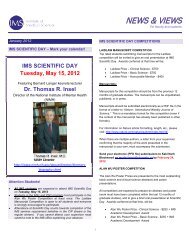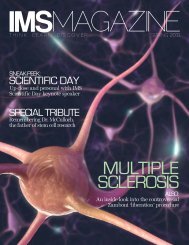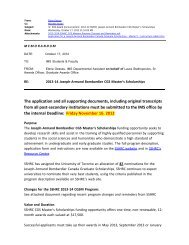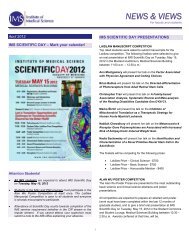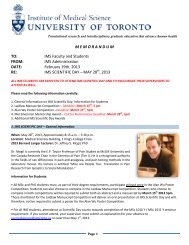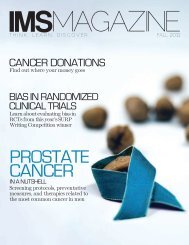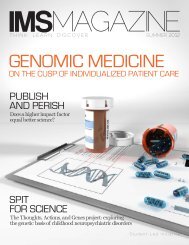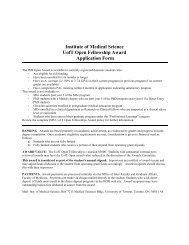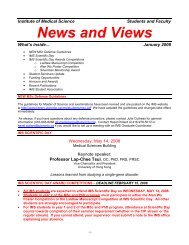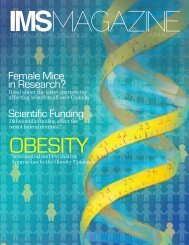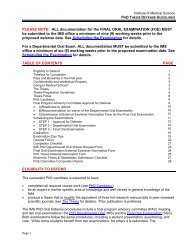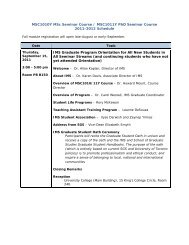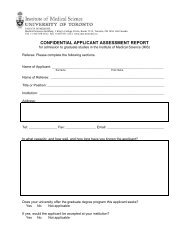<strong>Institute</strong> <strong>of</strong> <strong>Medical</strong> <strong>Science</strong><strong>MSc</strong> Thesis Defense <strong>Guidelines</strong>your thesis work will resolve them. The relevant literature should all be covered in this first section sothat the Discussion need not introduce new literature (unless it is extremely recent).Research Aims and HypothesesStrive for clarity. Research aims frame the general over-riding purpose <strong>of</strong> the project. Hypothesesare testable postulates about the nature <strong>of</strong> relationships in your field <strong>of</strong> study. State hypothesesexplicitly and summarize the arguments behind them. For most theses, specific research questionsare a series <strong>of</strong> experimental steps you take to test the hypotheses. Make sure that research aims,hypotheses and specific research questions are clearly aligned. In qualitative research theses, aims,hypotheses and key issues <strong>of</strong> research design typically emerge only through engagement in the field<strong>of</strong> study. Differences between hypothesis-driven investigation and qualitative research can give riseto confusion, and particularly so when mixed method approaches are used. If in doubt, studentsshould consult with the PAC for guidance on appropriate framing <strong>of</strong> the thesis research aims andstructure, early in the writing process.MethodsThese should be described in sufficient detail as to allow someone else to reproduce your work. If anovel technique is described, this section should be quite extensive. If the thesis is prepared in apaper format, a consolidated General Methods section can be used to provide the necessary detail.Very fine detail (e.g. chemical recipes) can be placed in an Appendix.ResultsIf you are preparing a paper format thesis, simply follow instructions to authors and norms common torespected journals in your field for each chapter <strong>of</strong> your experimental work. If you are using thetraditional format, you may find that it useful to provide more interpretation <strong>of</strong> the results than youwould in a shorter manuscript. This will help lead the reader through this extended section.Subheadings that indicate the "bottom line" for each set <strong>of</strong> related experiments are useful in the paperformat and essential in a traditional Results section.DiscussionA General Discussion is required in both traditional and paper format theses. In the paper format,discussion sections within individual chapters deal with results germane to experiments described ineach chapter. In contrast, the General Discussion addresses the thesis as a whole. A bit <strong>of</strong>repetition is inevitable. However, the depth <strong>of</strong> analysis in this section goes beyond your specificexperiments and findings. This section should address the broader issues raised by your work. Inthe General Discussion, you need to discuss how the discrete parts <strong>of</strong> your work fit together.Explicitly discuss the hypotheses, how your work has supported them and in what ways it has not.Were your aims realistic? If not, why not? What were the limitations <strong>of</strong> your approach? What hasyour work revealed that is novel? How is it novel? Does it conform or not to the literature in your field(the literature you have covered in your literature review)? In a traditional thesis, the singleDiscussion section covers both the interpretation <strong>of</strong> particular experimental results and these larger,contextual issues.ConclusionsThis section should clearly state the "bottom line" <strong>of</strong> your findings, including a reappraisal <strong>of</strong> yourhypotheses in light <strong>of</strong> your findings - i.e., whether your work supported or refuted your originalhypotheses. This section can also speculate on the implication <strong>of</strong> your findings.Future DirectionsThis is the fun part <strong>of</strong> your thesis! Where would you take this research program, were you to continuein the field over the next 6 months, 2 years, or 10 years? What are the most important questions thatemerge from your work and review <strong>of</strong> the field? How would you address them?Page 61-Oct-12
<strong>Institute</strong> <strong>of</strong> <strong>Medical</strong> <strong>Science</strong><strong>MSc</strong> Thesis Defense <strong>Guidelines</strong>ReferencesAll references cited in the thesis and all published sources identified in the Contributions section mustbe listed. In general, cite primary sources whenever possible. If using a secondary source, make thisclear (e.g. "reviewed in...."). You can use any one <strong>of</strong> the standard formats for references but beconsistent in its use. Double-check to ensure that references in the list are cited in the text and,conversely, that all citations in the text are listed in the References section. Missing citations, orreferences are a red flag to reviewers.10. THESIS FAQs1. How long should my thesis be?An <strong>MSc</strong> thesis is 100-120 pages, plus references.It includes:• Literature Review (~30 pages)• Hypotheses and Research Aims (~2-5 pages)• experimental work equivalent in depth to what would typically be contained in 1-2 peerreviewedpapers in substantive journals• General Discussion and Future Directions (10-25 pages)Consult with your supervisor and PAC to ensure that you have adequately covered the background toyour question, your results and their significance to the field. You may also find it helpful to discussyour outline and thesis plans with one <strong>of</strong> the Graduate Coordinators.2. English is not my native language. Does my thesis have to be written in perfect English?The grammar and spelling in your thesis must be <strong>of</strong> high standard, just as they would need to be inarticles submitted for publication. Please ask your supervisor and your committee to advise you onlanguage adequacy. Do not fall into the trap <strong>of</strong> taking verbatim passages from published papers ortextbooks because you think they are written in “better English” than you can produce.The following University <strong>of</strong> Toronto resources are available to students to improve their academicwriting and speaking skills:Office <strong>of</strong> English Language and Writing Support (ELWS)http://www.sgs.utoronto.ca/informationfor/students/englishSchool <strong>of</strong> Graduate Studies Resources: Writing and Speakinghttp://www.sgs.utoronto.ca/informationfor/students/english/wrtspk.htm3. When does borrowing from the work <strong>of</strong> others become plagiarism?Under The Code <strong>of</strong> Behaviour on Academic Matters, to plagiarize is to “… knowingly represent asone’s own any idea or expression <strong>of</strong> an idea or work <strong>of</strong> another” in an academic work. It is criticalthat the ideas and arguments <strong>of</strong> others be correctly attributed and simply paraphrasing these as yourown does not suffice. A more extensive discussion <strong>of</strong> the subject is provided in the guide “How Not toPlagarize”( http://www.utoronto.ca/writing/plagsep.html), an excellent online resource prepared by Dr.Margaret Procter, U <strong>of</strong> T Coordinator, Writing Support.4. Can I actually plagiarize my own work...!?It may seem surprising, but reproducing your own published work without proper acknowledgementcan be considered “self-plagiarism”. If you include such materials in your thesis, cite the publishedwork and submit a letter <strong>of</strong> permission from the copyright holder, or a statement from the publisher(<strong>of</strong>ten available on journal websites) authorizing use <strong>of</strong> the material, when you deposit your thesis.Page 71-Oct-12



